Boats, irrespective of their size, require a substantial amount of energy for various functions such as maintaining autopilot, illuminating navigation lights, and powering communication systems. Harnessing solar energy for boats is a revolutionary step towards clean, reliable, and cost-effective power. They serve as a dependable power source, ensuring the uninterrupted operation of onboard systems and appliances, from navigation and communication devices to lighting and refrigeration.
They also eliminate the need for carrying additional fuel or relying on marina power hookups, enhancing a boat’s autonomy and reducing operating costs. This way, the journey becomes more enjoyable and less restrictive, whether it’s a leisurely sail or an adventurous long-distance voyage. Adopting solar power for boats also has considerable environmental implications. By leveraging this renewable energy source, we can lower carbon footprints and contribute towards a greener, more sustainable future. Solar panels for boats create no noise pollution, making them the perfect energy solution for maintaining the serene ambiance of marine surroundings. Given these numerous advantages, it’s no surprise that more and more boat owners are equipping their vessels with solar panels. This article provides an in-depth look into the world of marine solar panels and sheds light on why they are an excellent choice for energy generation on your boat.
The operating principle of solar panels for boats is largely similar to their application on land-based systems, with some specific adjustments to cater to the marine environment. At their core, solar panels contain photovoltaic (PV) cells, which are semiconductors that absorb sunlight. This absorbed sunlight triggers the movement of electrons in the semiconductor material, producing an electric current.
When a solar panel is exposed to sunlight, it produces DC (Direct Current) electricity. However, many boat systems and appliances run on AC (Alternating Current) electricity, which requires the DC electricity to be converted via an inverter. In contrast, some boat-specific equipment, like navigation systems, radios, and certain light fixtures, run directly on DC power. One significant component of a solar power system is the charge controller, or solar regulator, which protects the batteries from overcharging by regulating the voltage and current coming from the solar panels.
Solar panels for boats are often coupled with a battery system for energy storage. The most commonly used batteries are lead-acid and lithium-ion, with the latter becoming increasingly popular due to their longer lifespan, high energy density, and decreasing costs. When sunlight is abundant, the solar panels charge these batteries, storing energy that can be used when the sun isn’t shining or during nighttime operations. In marine applications, solar panels need to be durable to withstand the harsh conditions at sea, including exposure to saltwater, strong winds, and extreme temperatures. Therefore, marine solar panels often come with water-resistant and corrosion-resistant features. They also need to be flexible or semi-flexible to conform to the shape of the vessel and must be installed in a way that does not interfere with the boat’s operations. One significant advantage of solar panels for boats is the potential for an infinite range. When sunlight is available, and the energy system, including battery storage, is well-managed, a solar-powered boat could theoretically operate indefinitely without the need for traditional refueling stops.
The application of solar energy transcends the limitations of boat sizes. Regardless of the vessel’s dimensions, incorporating solar power has proven to be an efficient and effective solution. Having enough space on your boat that is unobstructed and exposed to sunlight is crucial for the effective functioning of your solar panels. Shading can drastically reduce energy production. Therefore, it’s essential to identify a suitable spot for permanent installation. For boats with limited space, high-efficiency panels that produce more power per unit area are recommended. To determine the appropriate solar panel setup, you can review the power consumption of your appliances or use a battery monitor to assess your boat’s daily energy consumption. This, in conjunction with the size of your boat’s battery, will guide you in choosing the right solar panels.
Small-sized Boats: For small-sized boats, like dinghies or small sailboats, a limited solar setup can provide ample energy. These boats typically have fewer electronic systems, thus necessitating less power. Small, portable, or flexible solar panels can effectively cater to these energy needs without overwhelming the limited space.
Medium-sized Boats: Medium-sized boats, such as cabin cruisers or larger sailboats, often have more extensive electrical systems, including lighting, refrigeration, navigation equipment, and entertainment systems. They require a more substantial solar setup, often necessitating a combination of portable, flexible, and rigid solar panels to meet their energy demands efficiently.
Large-sized Boats: Large-sized boats like yachts or commercial ships have extensive and varied power needs, including substantial lighting systems, comprehensive navigation and communication equipment, HVAC systems, kitchen appliances, and more. These vessels require a significant investment in solar infrastructure. A combination of high-efficiency rigid solar panels, potentially supplemented with flexible panels to utilize available space, can help meet these higher power demands.
It is important to note that while solar power is a fantastic solution for energy generation on boats of all sizes, the individual needs, space availability, and power requirements should always be considered when designing a boat’s solar energy system.
While installing a solar panel system on your boat, consider incorporating a charge controller. This device ensures your battery is neither overloaded nor overcharged, thereby prolonging its lifespan. Even though it’s not strictly necessary, a charge controller helps your boat use just the right amount of energy and is generally a good idea to install.
Boating enthusiasts have a wide range of solar panel options to choose from, each with unique benefits and drawbacks. It’s crucial to choose the right one for your boat, taking into account your specific needs, the vessel’s size, and the available space. Here’s a closer look at the three main types:
Portable solar panels are growing in popularity among boat owners due to their mobility and easy installation. Their compact design allows for straightforward transportation and setup, making them an excellent option for those seeking a reliable energy source onboard. These solar solutions are not only cost-effective, as they negate the need for fuel, but they’re also maintenance-free and eco-friendly. They produce zero emissions and don’t contribute to noise pollution. When considering portable panels, factors like size, power output rating, and panel quality are critical. It’s equally important to ensure they are waterproof and weather-resistant — panels with an IP68 rating are ideal. Portable panels are an exemplary choice for boaters wanting to keep their ecological footprint minimal while maintaining a steady power supply.
Rigid solar panels provide a long-term solution for those wanting a steady power supply for their boat. These are permanently affixed to the boat’s surface and usually composed of robust materials such as tempered glass or aluminum, making them durable. Rigid panels are prized for their efficiency, generating a higher power yield per square inch than portable alternatives. This makes them well-suited for larger vessels or boats with substantial energy needs. Their durability is another significant benefit. These panels can withstand harsh marine conditions, including constant saltwater exposure and extreme weather. However, it’s crucial to ensure that the selected panels are waterproof, with an IP68 rating being optimal. Installation can be complex due to the permanent nature of these panels. Proper mounting is vital to prevent potential damage or loss. Despite this complexity, rigid panels offer room for customization and expansion, as you can form larger arrays by connecting several panels.
Flexible solar panels, a recent innovation in solar technology, offer a more adaptable alternative to rigid panels. These consist of lightweight and bendable materials, such as thin-film photovoltaic cells, allowing them to conform to curved or uneven surfaces. The primary advantage of flexible panels is their adaptability. They can fit onto a variety of surfaces, making them an ideal choice for boats, recreational vehicles, and other outdoor applications. Their lightweight design is beneficial where weight restrictions apply.
Flexible panels are also quite durable, capable of enduring severe weather conditions such as hail, rain, and high winds. As with other types, an IP68 waterproof rating is crucial. However, flexible panels do have their drawbacks. They typically generate less power than rigid panels, which can limit their ability to meet high energy demands. They also tend to have shorter lifespans and may need replacing more frequently. In conclusion, flexible panels are best suited for enhancing a rigid solar panel system, allowing you to utilize all available space for solar power generation. They are not intended to be the sole solar solution.
The process of choosing the right solar panel for your boat entails several considerations, each essential in ensuring an optimal and efficient solar energy system. Here are the key factors to take into account:
Power Output: First, it’s essential to identify the total energy required by all electrical equipment aboard your boat. This can be achieved by estimating each device’s wattage and operational duration. Following this, calculate the minimum panel output needed to cater to this energy demand by dividing the total watt-hours required by the average number of sunlight hours per day. The power output also influences the choice of your solar battery and system balance since the overall solar power system must be compatible with your photovoltaic (PV) panels. Note that you cannot feed electricity directly from the panels into your boat appliances; a portable power station or a similar solution is needed to store and distribute the energy.
Durability and Weather Resistance: It’s crucial to ensure your chosen solar panels are resistant to impact and adverse weather conditions. An IP68 waterproof rating is highly recommended to protect your panels from wave splashes and rainfall.
Size and Weight: The dimensions and weight of the panels should correspond to your energy needs and the available space on your boat. Aim to choose panels that can meet your energy demands without occupying too much space or adding significant weight.
Installation and Maintenance: Consider the time and cost required for installation and maintenance. Depending on the complexity, you might need professional assistance for installation. Note that not all panels require mounting brackets; portable panels allow for flexibility and cost-saving, bypassing the need for permanent installation.
Brand Reputation: It’s advisable to invest in solar panels from a trusted brand with a proven track record of quality and reliability. Seeking reviews and insights from other boat owners can be beneficial when making your decision.
Cost: Solar panel costs can vary based on size, efficiency, and brand. Keep your budget in mind and aim to select panels that offer the best return on investment.
When choosing the perfect solar panel for your boat, several factors should be considered, such as efficiency, cost, ease of installation, and durability. Here, we delve into five top-notch solar panels for boats based on EcoWatch:
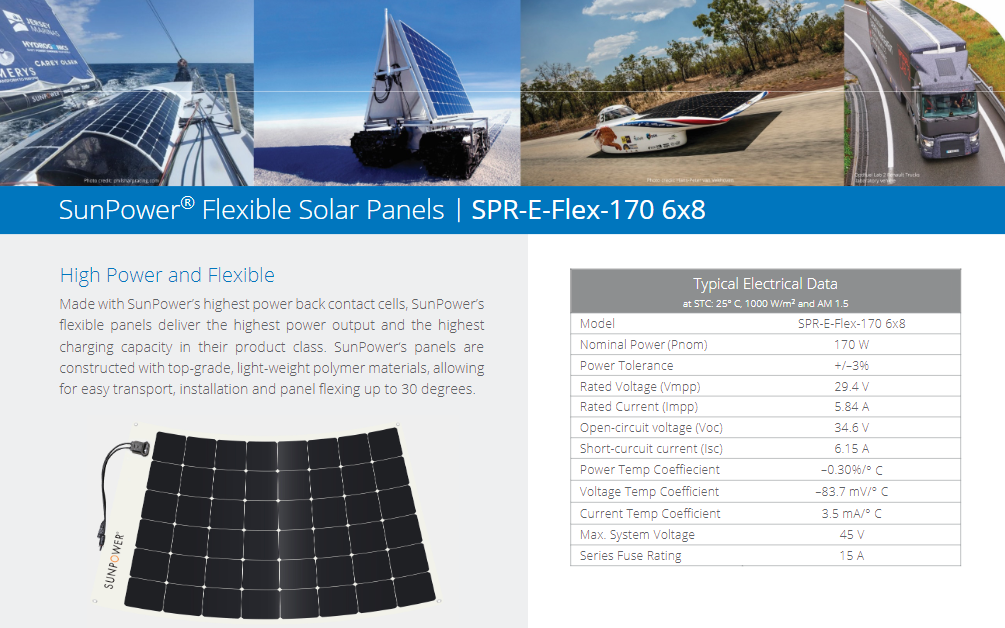
Known for their excellent residential solar panels, SunPower extends their reputation into marine applications with their high-performance 170W solar panel. This unit comes at a higher cost, but its robust power output justifies the price. With this panel, you can comfortably power your boat’s primary battery, emergency backups, and various appliances. Unfortunately, this package doesn’t include a solar charge controller or an inverter, necessitating extra expenses. Nevertheless, the power efficiency makes the investment worthwhile. The panel carries an IP67 waterproof rating, enabling it to survive water immersion up to three feet for about half an hour.
Pros:
Cons:
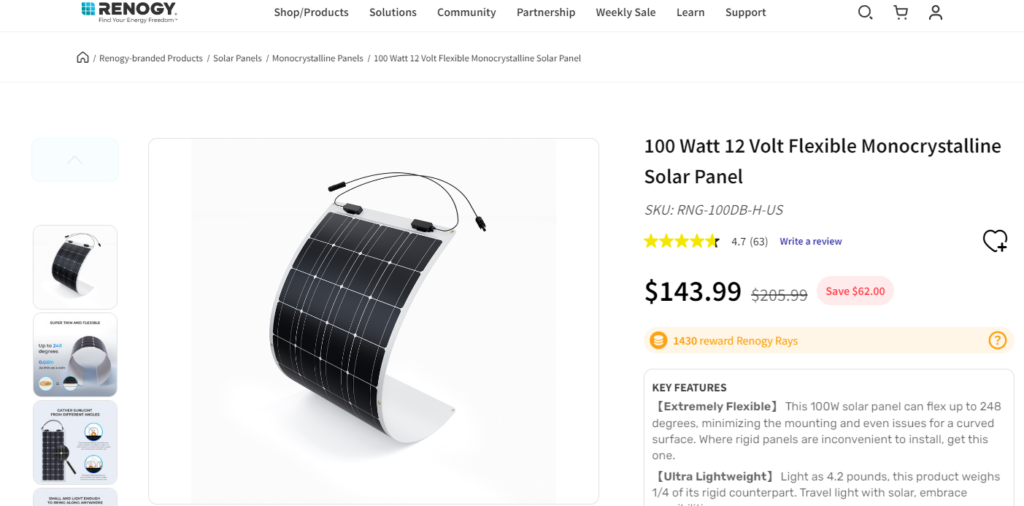
For a reasonable cost, the Renogy Flexible solar panel offers respectable power output and waterproofing. With a capacity of 100W, it’s an excellent choice for moderate power needs, charging various electronic devices. It also includes a controller and wiring, only requiring an inverter and battery to complete the setup.
Pros:
Cons:
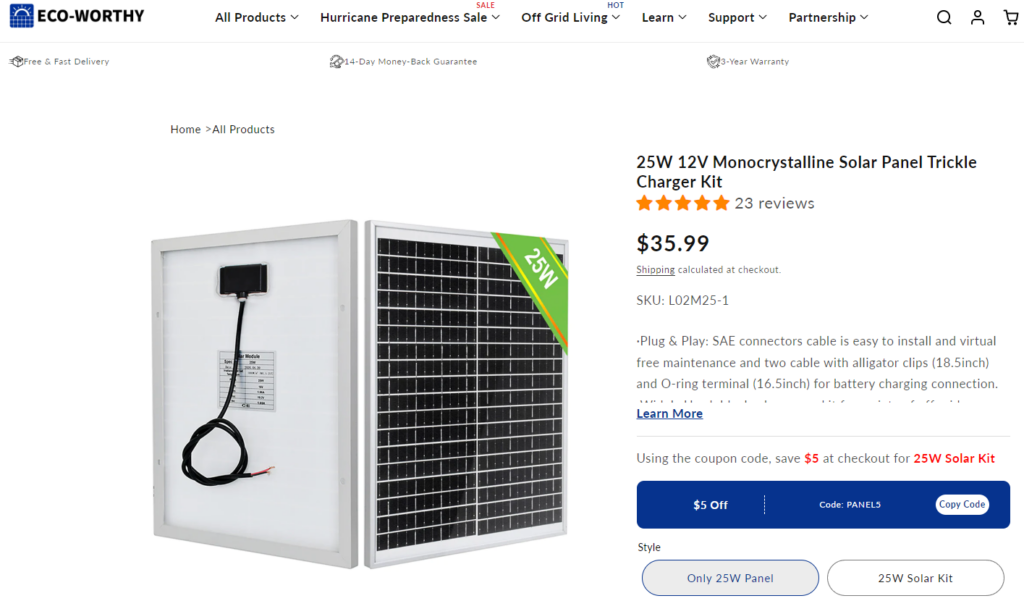
For those new to solar energy, the EcoWorthy solar panel kit makes a great entry point. The kit includes MC4 connectors, making installation quick and hassle-free. However, its smaller power output restricts its use to backup power or charging smaller electronics. With an IP65 rating, it can endure water submersion up to five feet for half an hour.
Pros:
Cons:
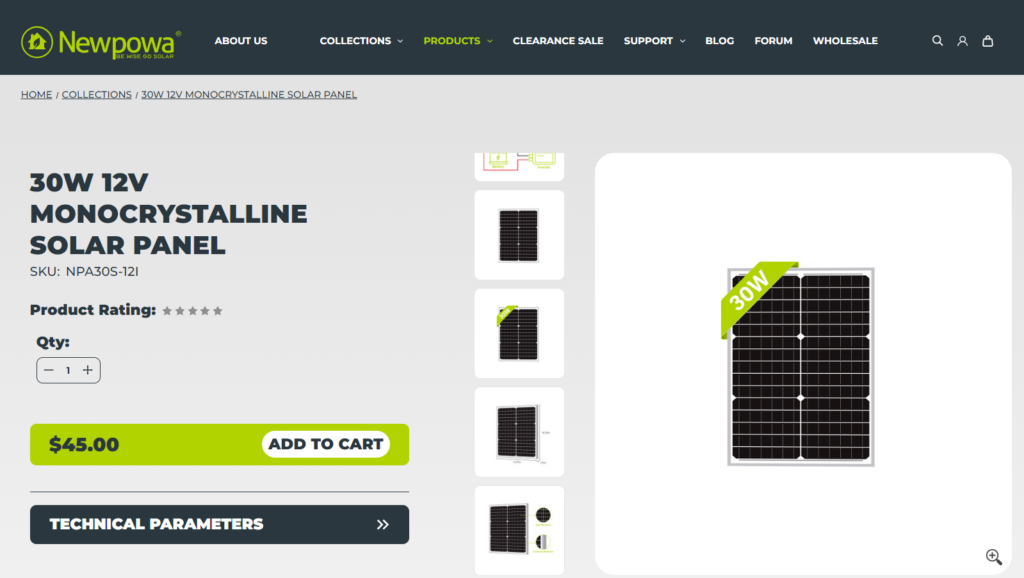
The NewPowa solar panel kit is a cost-effective option that includes a panel, a controller, and wiring. With a 30W output, it’s well-suited for light-duty use. Its IP67-rated panels and controller make it a safe choice for various boat types.
Pros:
Cons:
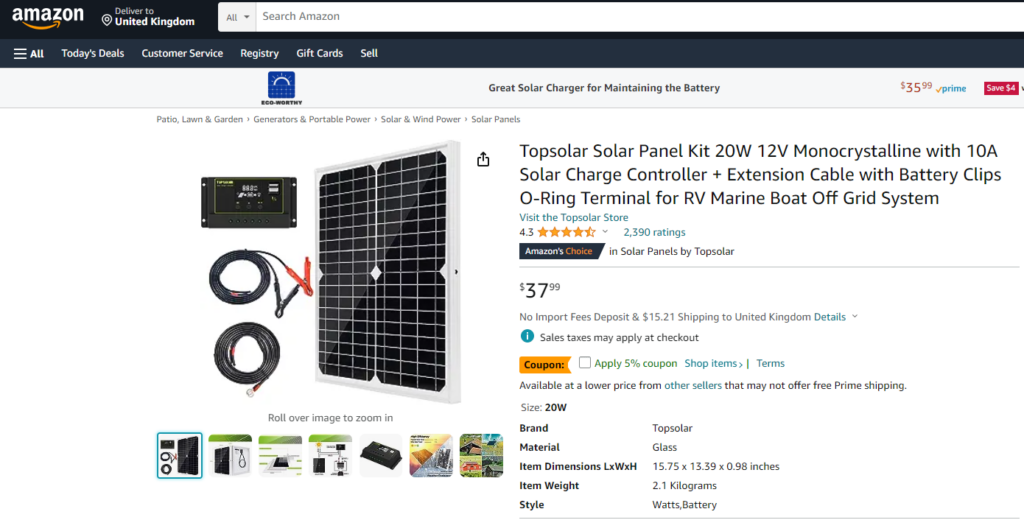
If you’re a beginner seeking a backup energy source, the TopSolar kit is an excellent choice. While its 20W output limits its use to emergency power, it’s easy to install and comes at a lower price. Though no specific IP rating is provided, the manufacturer claims it is waterproof.
Pros:
Cons:
Opting to install solar panels on your boat opens a gateway into the realm of clean energy, significantly improving your boating experience in multiple ways. There are a few key use cases that help illustrate the value of adopting a solar panel system on your boat. These scenarios do not only help determine the necessity of solar panels for your vessel, but they also aid in identifying the most suitable and cost-efficient system for your needs. Below, we delve into the different motivations for embracing solar power on your boat.
The unpredictable nature of sea adventures underscores the importance of having reliable emergency equipment on board. Whether you find yourself in a situation where you’ve run out of fuel, encountered a mechanical issue, or faced with other unforeseen complications preventing a safe return to shore, having a dependable communication device can be a lifesaver. Many boats are equipped with emergency systems such as radio systems, satellite phones, or regular phones. However, these devices are reliant on power. By integrating a solar system into your boat, you can ensure a continuous power supply for these devices, providing peace of mind during your sea excursions.
Beyond emergencies, the utility of solar panels extends to everyday recreational needs. Having the ability to charge devices like smartphones, e-readers, speakers, and other entertainment equipment can enhance your sea experience. This aspect gains significance, especially if you plan on spending multiple days at sea and don’t want to deplete your boat’s batteries. By allowing your solar system to handle the power needs of your recreational equipment, you ensure that your boat’s batteries remain sufficiently charged for critical functions such as lighting, navigation tools, and starting your boat’s engine.
Solar systems for boats are generally hassle-free once installed, requiring only periodic maintenance to ensure safety and optimal energy production. Approximately every six months, it’s advisable to clean your solar panels by rinsing them with water to remove any accumulation of dirt or salt. This simple routine helps maintain the panels’ efficiency by maximizing energy generation. During these semiannual checks, it’s also crucial to inspect the system’s wires and connectors for signs of corrosion, especially if your boat operates in saltwater environments. Checking for intact connections after major storms is a prudent practice to avoid battery charging issues, which could pose a problem if backup power is ever needed. Solar systems on boats are generally considered safe. There is a minimal risk of fire, but regular maintenance and system checks can effectively mitigate such risks. Therefore, while the maintenance required is not extensive, its impact on safety and efficiency is significant.
Installing solar panels on your boat presents an array of benefits that enhance your boating experience while also contributing to the preservation of our planet. From powering emergency and recreational equipment, improving your quality of life at sea, offering a low-maintenance energy solution, to providing silent operation, the advantages of solar power on the water are undeniable. Choosing the right solar panels for your boat might require some careful consideration and calculations, but the payoff in terms of cost savings, environmental impact, and overall comfort is certainly worth the investment. With the advancements in solar technology and growing awareness of sustainable practices, it’s an opportune time to harness the power of the sun and sail towards a greener future.
While not strictly necessary, a charge controller helps regulate the voltage and current coming from the solar panels, protecting the batteries from overcharging and prolonging their lifespan.
Solar panels on boats require minimal maintenance. Periodic cleaning to remove dirt, salt, or debris and checking connections for any signs of damage or corrosion are recommended to ensure optimal performance.
Stay a while and read more posts like this
In recent years, Europe has witnessed a remarkable surge in the adoption of solar panels, marking a pivotal shift towards renewable energy. Data from the...
Renewable Energy, Solar Energy, Solar Energy Basics, Solar Technology
“Unlock the Truth: Get the Facts on Solar Energy!” Introduction Solar energy is becoming increasingly popular as a renewable energy source, but there are...
Imagine a world where you’re able to cut your monthly energy expenditure substantially. A reality where your home isn’t reliant on finite,...